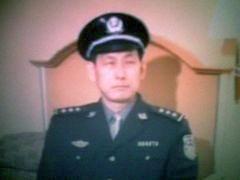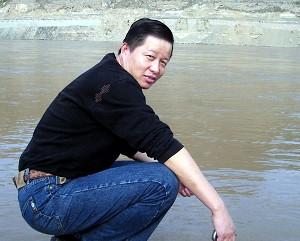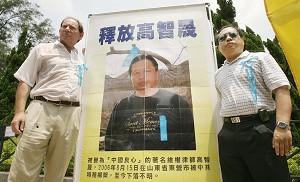Describing an elaborate scheme of quotas, financial perks, and central government involvement, a former Chinese policeman says the authorities are stealing organs from people detained in China.
“Organ harvesting in China has reached an excessive and unbelievable state,” says Zhang Jianhua during a New Tang Dynasty Television interview. “The government is out of control. It doesn’t care about people’s lives and deaths.”
Zhang came forward with his story after reports that Falun Gong adherents, imprisoned by the communist regime for their beliefs, have had their organs stolen and sold for profit in a lucrative organ trade. A report released last month by Canada’s former secretary of state for Asia David Kilgour and human rights lawyer David Matas found that the organ harvesting of Falun Gong was indeed taking place in China.
Zhang, a former officer at the Shenzhen Public Security Bureau (PSB) in Guangzhou Province, made the TV appearance wearing his old uniform with his police ID number clearly visible. He says he fled to the United States after being punished for trying to expose police maltreatment of prisoners, including detained Falun Gong practitioners.
“The Body Was Empty”
Zhang says he personally witnessed evidence of organ harvesting of an executed prisoner.
In 1998, a convicted drug trafficker from Zhang’s district was scheduled to be executed. The inmate’s name was Chen Longzai, whose family Zhang had met in Hong Kong and befriended.
Before Chen’s execution, the prisoner’s brother approached Zhang and requested his help in seeing Chen’s body one last time after the execution. Zhang says the brother was concerned that Chen’s organs would be removed. Chinese people have traditionally believed bodies should be kept intact after death.
Zhang agreed to the brother’s request. He lent him a spare uniform and drove to the execution site. According to Zhang, immediately following the execution the prisoners’ bodies were loaded into vans and driven to the crematorium in a journey that lasted two hours.
“The operation was conducted inside a van,” he says. “The vehicle drove slowly but steadily, which was probably to facilitate the operation. Armed police vehicles escorted the vans.”
Upon arriving at the crematorium, Zhang and his companion found that police had sealed it off. After the two talked a guard into letting them in to see the body, an officer unzipped the body bag.
“We stood two meters away from the body,” says Zhang. “As soon as he unzipped the bag, blood poured out. We could see that the body was empty and all the organs were gone. The eyes were gone as well—perhaps corneas were needed.”
The prisoner’s brother wanted to expose the story to the media, but Zhang convinced him to remain silent for fear of his own safety. He says that such silence is bought from many of those involved in organ harvesting, through money, fame or intimidation.
Zhang’s account is echoed by other witnesses, including Gao Peiqi, another former PSB officer who testified before a U.S. Senate hearing in 1995. Amnesty International and Human Rights Watch have raised similar concerns in their reports.
Funding Available
According to Zhang, the Ministry of Public Security assigns execution quotas to local security bureaus depending on the area’s crime rate. In his district of Shenzhen City, Zhang says that the quota was between ten and twenty per year. A stipulation added: “the more the better.”
Zhang says his office came under significant pressure from above when it had difficulty fulfilling what he calls the “annual killing quota.”
According to Zhang, accompanying the quota system are financial incentives.
“Our district Party Secretary Liu Zhigeng said, ‘When you execute one criminal our Longgang District will award your bureau 30,000 yuan,’” or about $3,700 US, he says.
Zhang says that the origins of such funds lie with the central government’s Finance Department which allocates money for organ harvesting to the Department of Public Health.
The Health Department then passes the funds on to several large hospitals that reportedly use them to purchase specialized vans for removing prisoners’ organs en route from the execution site to the crematorium. Zhang says these funds are often increased in the months of October and November during the “strike-hard” campaigns when arrests increase.
Other funds come from overseas.
“Many instruments come from foreign institutions specializing in this type of equipment,” says Zhang. “These institutions loan money to you and give you any equipment you want, generating a substantial circulation of money.”
Besides funding, Zhang says that doctors, including foreign ones, are drawn into China’s bottomless organ market for purposes of research and career advancement.
“Their [medical] study can move ahead because China has so many organs for them to study,” Zhang says, adding that if the operation fails doctors simply obtain another organ and try again.
“Other countries cannot do this,” Zhang says, as doctors will be sued if they botch operations. But, “in China, where can you sue?”
“All is under the Chinese Communist Party,” he says. “Go to Beijing to sue, but you may have your own organs removed.”
While Zhang detailed the system of organ theft from executed prisoners, it appears practice has also spilled over to China’s huge forced labour camp system, where Chinese—often religious believers or political dissidents—can be held for years without trial.
Kilgour and Matas noted in their report that there had been a surge in organ transplants from unexplained donors after the persecution of Falun Gong was launched in 1999. They concluded that 41,500 organs had been removed from Falun Gong detained in labour camps.


